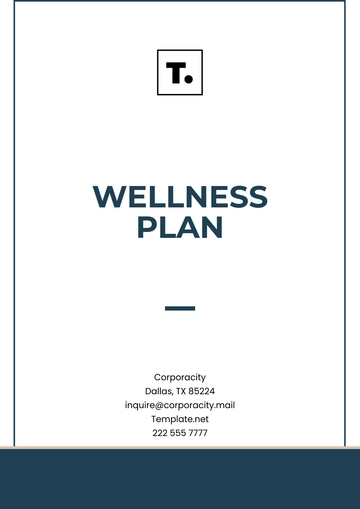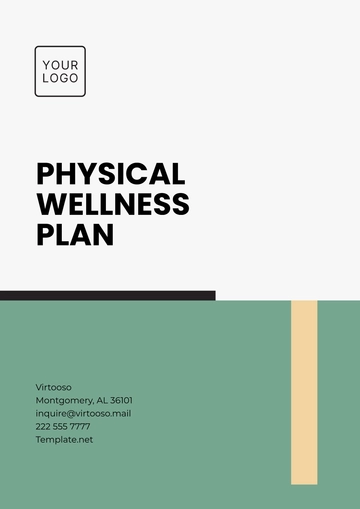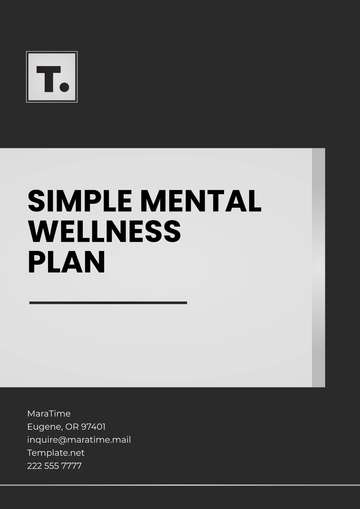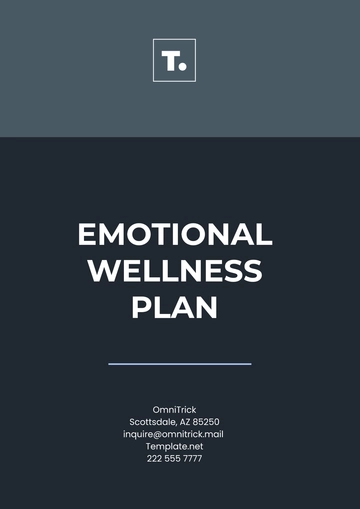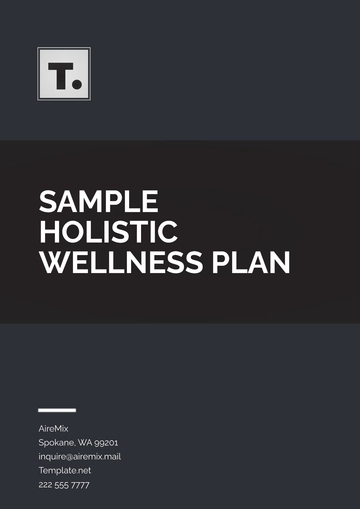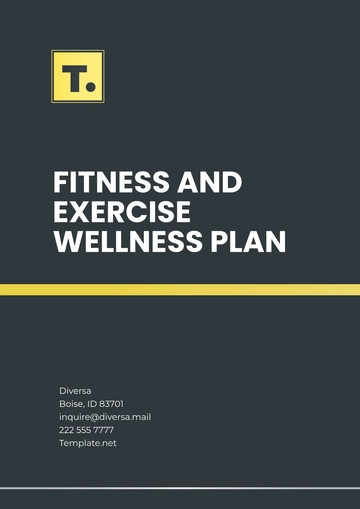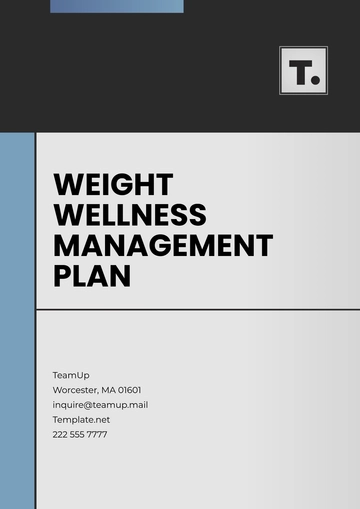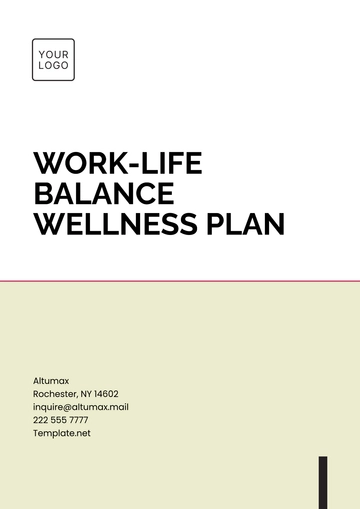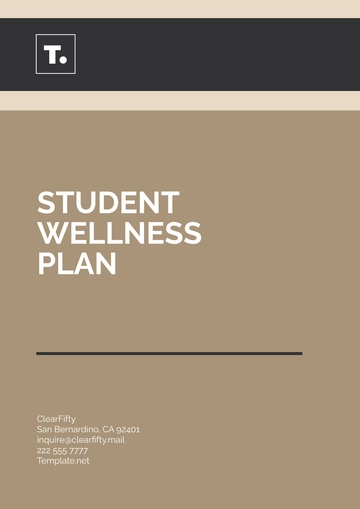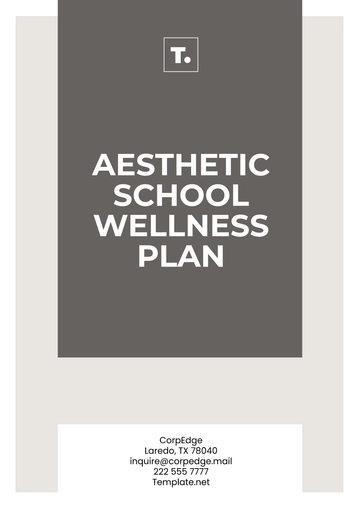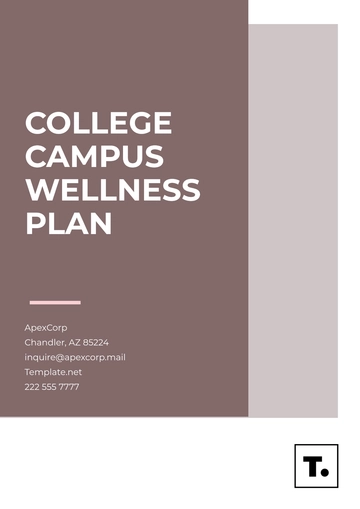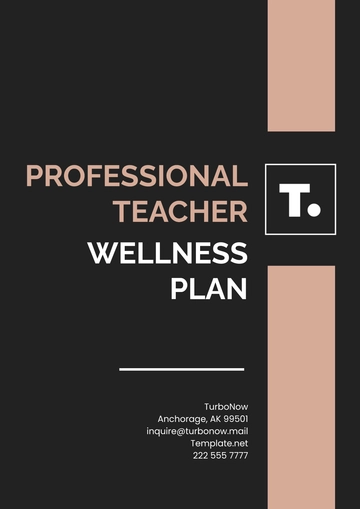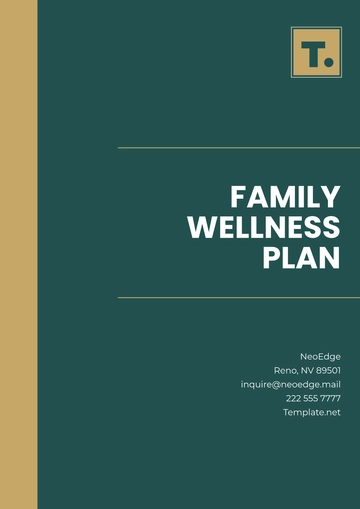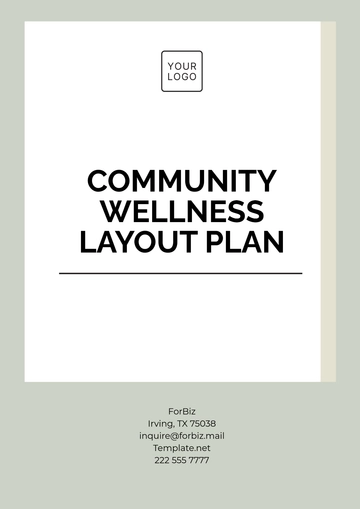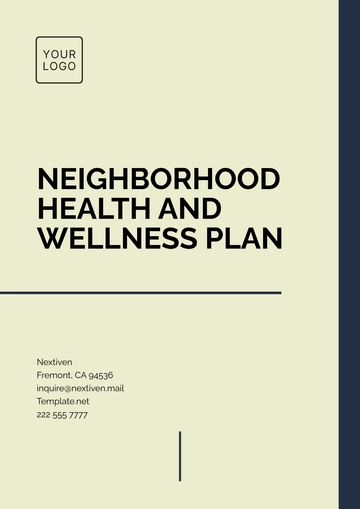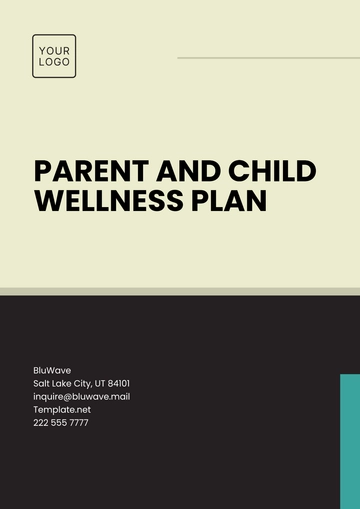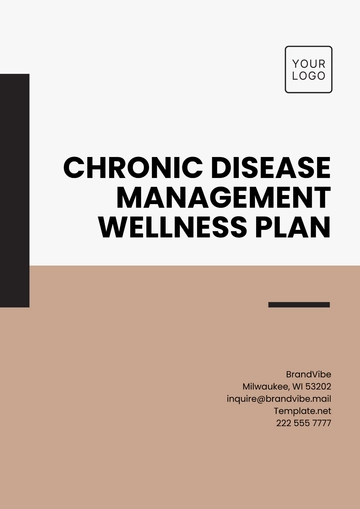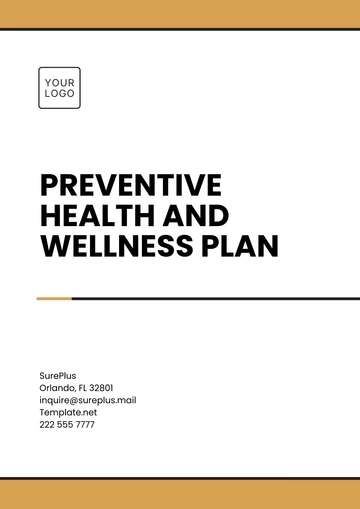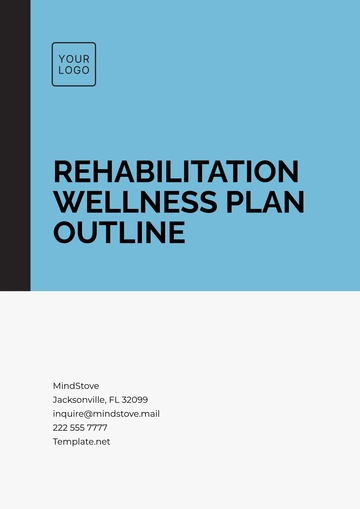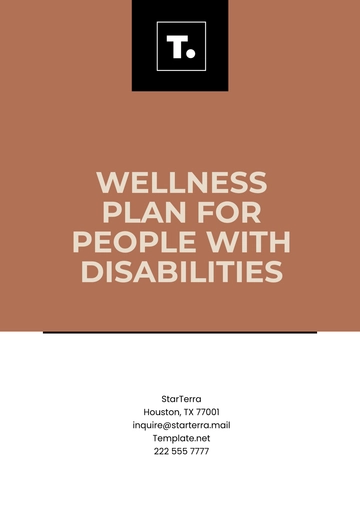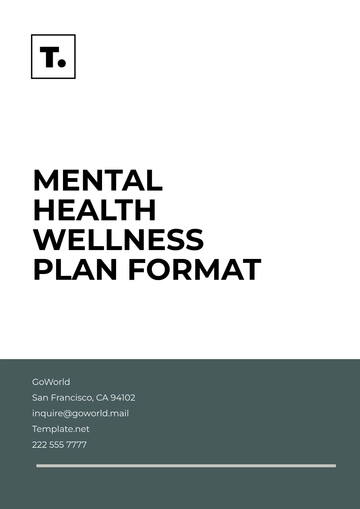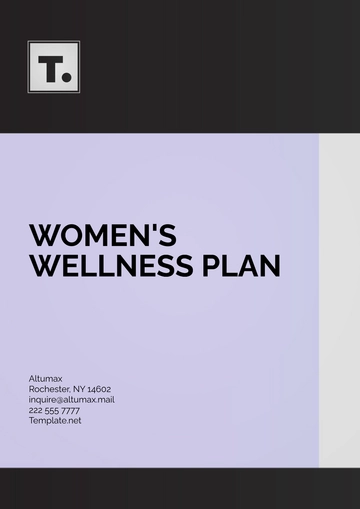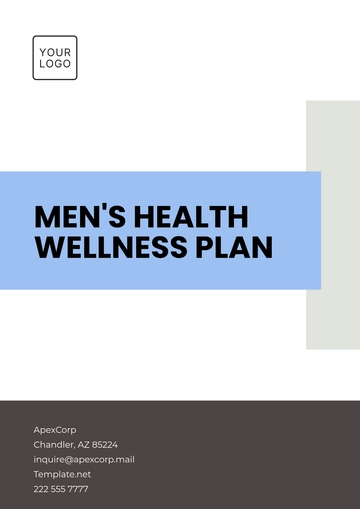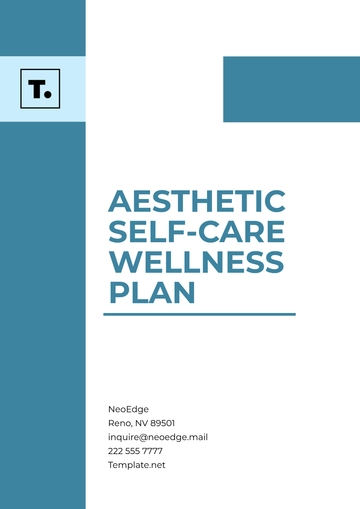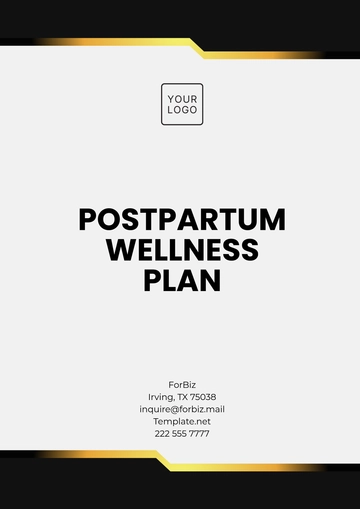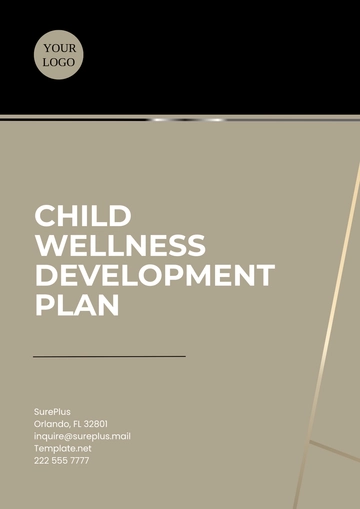Free Parent and Child Wellness Plan
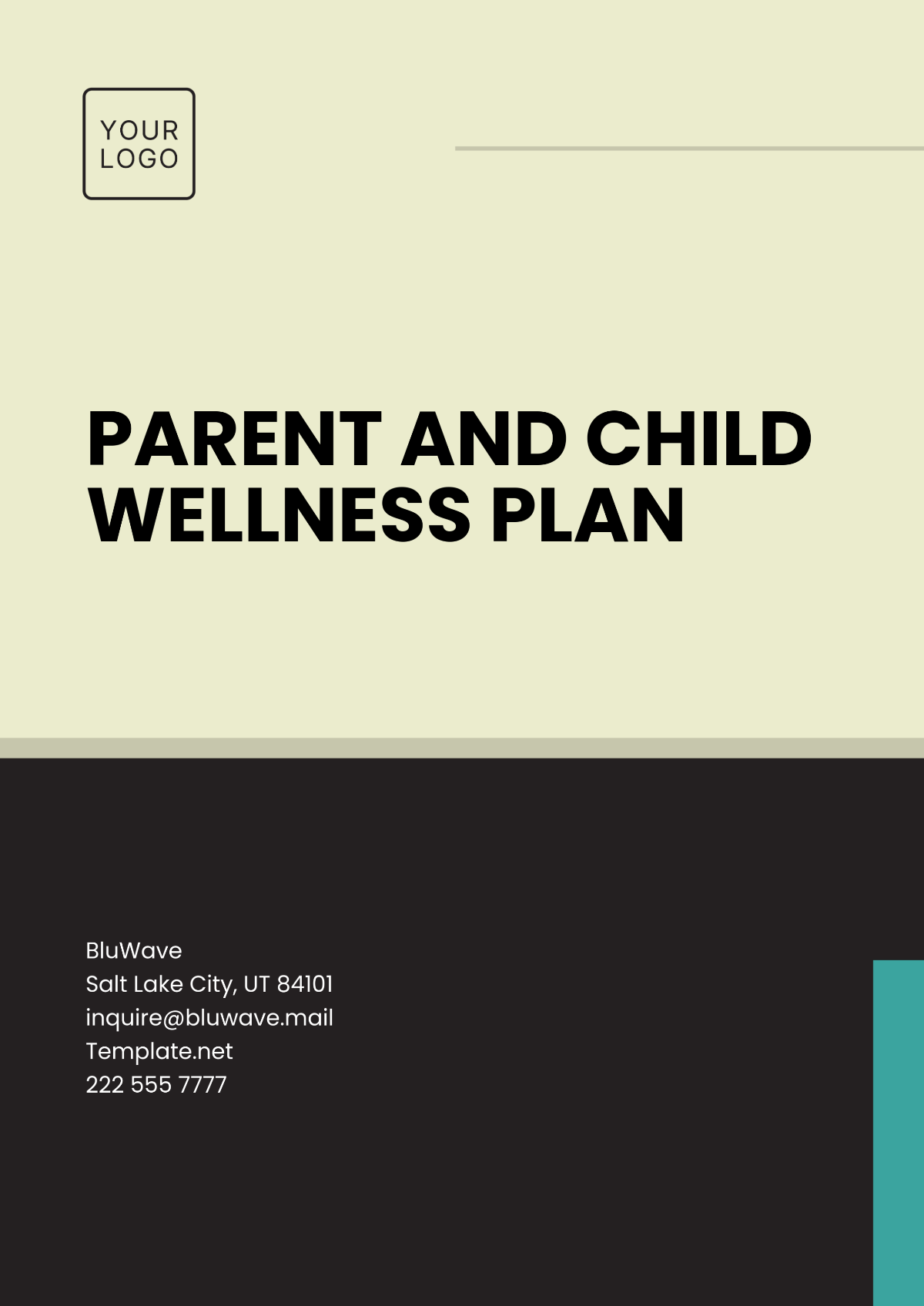
Prepared by: [Your Name]
Company: [Your Company Name]
Date: [Insert Date]
I. Introduction
The Parent and Child Wellness Plan is designed to promote the overall well-being of families by focusing on the health and wellness of both parents and children. This plan emphasizes the importance of nurturing physical, mental, and emotional health within the family unit, creating a holistic approach to wellness. By offering resources, education, and support, this plan aims to help parents raise healthy, happy children while ensuring their own health needs are met.
II. Vision and Goals
A. Vision
To create a supportive and healthy environment where parents and children can thrive together, fostering strong family relationships and promoting lifelong wellness practices.
Goals
Enhance Physical Health: Support the physical well-being of both parents and children through healthy habits, nutrition, and regular physical activity.
Promote Mental and Emotional Wellness: Address mental health needs by offering resources and strategies for coping with stress, building resilience, and promoting positive mental health.
Strengthen Family Bonds: Encourage quality time between parents and children, fostering healthy relationships, communication, and support.
Ensure Access to Resources: Provide families with the tools, knowledge, and services they need to maintain their well-being, including health screenings, educational programs, and support services.
Foster Healthy Lifestyle Choices: Empower parents and children with the skills and knowledge to make healthy decisions regarding nutrition, physical activity, and overall lifestyle.
III. Key Areas of Focus and Strategies
A. Physical Health and Wellness
Strategies:
Family Fitness Programs: Offer activities that promote family engagement, such as family walks, biking events, and fitness challenges, to encourage both parents and children to stay active together.
Nutrition Education: Organize family-focused nutrition workshops to educate parents and children on healthy eating habits, portion control, and the importance of a balanced diet.
Health Screenings and Preventive Care: Provide access to routine health check-ups, immunizations, and screenings for children and parents to catch any potential health issues early.
Meal Planning Support: Offer meal planning resources that focus on budget-friendly, nutritious meals that can be enjoyed by the whole family.
Healthy Snacking Programs: Promote healthy snacking habits by providing families with easy and nutritious snack ideas that are both tasty and good for their health.
B. Mental and Emotional Wellness
Strategies:
Stress Management Workshops for Parents: Provide workshops and resources that teach stress-relief techniques such as mindfulness, deep breathing, and time management for parents dealing with daily responsibilities.
Parenting Support Groups: Create support groups for parents to share experiences, ask for advice, and build connections with others facing similar challenges.
Child Development and Emotional Health Workshops: Offer classes for parents on recognizing and nurturing emotional development in children, teaching them how to foster emotional intelligence and resilience.
Mindfulness and Coping Strategies for Children: Teach children age-appropriate mindfulness practices, relaxation techniques, and coping strategies to help them manage stress and emotions.
Family Counseling Services: Provide access to counseling and therapy services for families who may need professional support for emotional or behavioral challenges.
C. Strengthening Family Bonds
Strategies:
Family Time Initiatives: Promote the importance of family time through organized activities like family game nights, weekend outings, or cooking together as a family.
Communication Skills Programs: Offer programs focused on improving communication within families, teaching both parents and children how to express themselves and listen actively.
Conflict Resolution Workshops: Equip families with tools for resolving conflicts in healthy ways, teaching strategies such as active listening, compromise, and understanding.
Parent-Child Bonding Activities: Organize special parent-child bonding activities, such as arts and crafts, hiking, or volunteering together, to strengthen relationships and create lasting memories.
Family Support Networks: Develop local community groups where families can support one another, share resources, and participate in joint activities.
D. Access to Resources
Strategies:
Parenting Education: Offer ongoing parenting education classes that cover topics like child development, behavior management, and understanding family dynamics.
Resource Referrals: Provide families with information on local resources such as healthcare services, food assistance programs, childcare, and early childhood education.
Health Literacy Programs: Ensure that parents and children understand important health information, including how to access healthcare services, manage chronic conditions, and make informed decisions about health.
Financial Literacy for Parents: Offer financial wellness workshops for parents, teaching them about budgeting, saving, and managing expenses related to healthcare, education, and family needs.
Support for Single Parents: Provide additional support and resources specifically for single parents, such as networking opportunities and access to childcare resources.
E. Healthy Lifestyle Choices
Strategies:
Active Living Programs: Organize community events and programs that encourage physical activity for all family members, including sports leagues, walking clubs, and fitness challenges.
Healthier Home Environment Tips: Educate families on creating a healthier living environment by reducing exposure to toxins, improving air quality, and implementing eco-friendly habits.
Digital Detox Programs: Promote the benefits of limiting screen time and encourage families to spend more time engaging in physical activities and face-to-face communication.
Sleep Education: Provide resources for families to establish healthy sleep routines, emphasizing the importance of quality sleep for both parents and children.
Substance Abuse Prevention: Offer education and support for parents on how to discuss substance abuse prevention with children, as well as how to address challenges related to addiction or substance abuse within the family.
IV. Implementation Plan
A. Roles and Responsibilities
Community Leaders: Oversee the implementation of the wellness plan and act as advocates for healthy family practices within the community.
Local Healthcare Providers: Partner with health professionals to provide screenings, educational resources, and medical care to families in need.
Parents: Actively engage in wellness programs, set positive examples for their children, and advocate for the health and well-being of their families.
Schools and Educational Institutions: Collaborate to offer educational workshops and resources that promote wellness and healthy habits among students and their families.
Community-Based Organizations: Partner with local organizations to provide support services, community events, and resources to families.
B. Timeline
Phase 1 (Month 1-3): Launch wellness programs, conduct community outreach to engage families, and initiate family fitness activities and nutrition workshops.
Phase 2 (Month 4-6): Expand mental health programs, hold family communication workshops, and organize family-friendly events to strengthen social connections.
Phase 3 (Month 7-12): Continue to grow wellness initiatives, monitor progress through surveys and feedback, and adjust programs as needed based on community needs.
Ongoing: Maintain and adapt the wellness plan to meet the evolving needs of families in the community, ensuring long-term sustainability and engagement.
V. Evaluation and Assessment
A. Key Performance Indicators (KPIs)
Participation Rates: Track the number of families attending wellness events, fitness programs, and workshops.
Health Improvements: Monitor improvements in health metrics such as increased physical activity, improved nutrition, and mental health outcomes for both parents and children.
Family Satisfaction: Collect feedback from families through surveys to assess the effectiveness and relevance of the wellness programs.
Community Engagement: Measure the level of participation in community-building activities, including social events, family support groups, and volunteer opportunities.
Access to Resources: Evaluate how well families are utilizing available resources, such as healthcare services, financial education, and family support programs.
B. Methods of Evaluation
Surveys and Feedback: Regularly survey parents and children to assess satisfaction with programs and identify areas for improvement.
Focus Groups: Conduct focus groups with parents to gather qualitative feedback about their needs and experiences.
Health Outcome Tracking: Collect data from health screenings and wellness check-ins to assess improvements in physical and mental health.
Program Assessments: Hold periodic reviews of each program to measure effectiveness, adjust strategies, and ensure alignment with community goals.
VI. Sustainability Plan
Community Empowerment: Encourage ongoing participation from parents and community members to maintain the momentum of the wellness programs.
Partnerships: Continue developing partnerships with local healthcare providers, educational institutions, and community organizations to secure ongoing resources and support.
Fundraising and Grant Opportunities: Explore funding opportunities through grants, donations, and local businesses to ensure the long-term sustainability of the wellness programs.
Ongoing Education: Ensure that families continue to receive updated health information, as well as access to new wellness resources and educational opportunities.
VII. Conclusion
The Parent and Child Wellness Plan is a comprehensive approach to fostering healthy families by addressing the physical, mental, and emotional well-being of both parents and children. Through community engagement, education, and support, this plan aims to create an environment where families can thrive together, build stronger bonds, and make healthier lifestyle choices. By focusing on wellness across all aspects of family life, this plan provides families with the resources and tools they need to improve their overall quality of life and create a positive impact on future generations.
- 100% Customizable, free editor
- Access 1 Million+ Templates, photo’s & graphics
- Download or share as a template
- Click and replace photos, graphics, text, backgrounds
- Resize, crop, AI write & more
- Access advanced editor
You may also like
- Finance Plan
- Construction Plan
- Sales Plan
- Development Plan
- Career Plan
- Budget Plan
- HR Plan
- Education Plan
- Transition Plan
- Work Plan
- Training Plan
- Communication Plan
- Operation Plan
- Health And Safety Plan
- Strategy Plan
- Professional Development Plan
- Advertising Plan
- Risk Management Plan
- Restaurant Plan
- School Plan
- Nursing Home Patient Care Plan
- Nursing Care Plan
- Plan Event
- Startup Plan
- Social Media Plan
- Staffing Plan
- Annual Plan
- Content Plan
- Payment Plan
- Implementation Plan
- Hotel Plan
- Workout Plan
- Accounting Plan
- Campaign Plan
- Essay Plan
- 30 60 90 Day Plan
- Research Plan
- Recruitment Plan
- 90 Day Plan
- Quarterly Plan
- Emergency Plan
- 5 Year Plan
- Gym Plan
- Personal Plan
- IT and Software Plan
- Treatment Plan
- Real Estate Plan
- Law Firm Plan
- Healthcare Plan
- Improvement Plan
- Media Plan
- 5 Year Business Plan
- Learning Plan
- Marketing Campaign Plan
- Travel Agency Plan
- Cleaning Services Plan
- Interior Design Plan
- Performance Plan
- PR Plan
- Birth Plan
- Life Plan
- SEO Plan
- Disaster Recovery Plan
- Continuity Plan
- Launch Plan
- Legal Plan
- Behavior Plan
- Performance Improvement Plan
- Salon Plan
- Security Plan
- Security Management Plan
- Employee Development Plan
- Quality Plan
- Service Improvement Plan
- Growth Plan
- Incident Response Plan
- Basketball Plan
- Emergency Action Plan
- Product Launch Plan
- Spa Plan
- Employee Training Plan
- Data Analysis Plan
- Employee Action Plan
- Territory Plan
- Audit Plan
- Classroom Plan
- Activity Plan
- Parenting Plan
- Care Plan
- Project Execution Plan
- Exercise Plan
- Internship Plan
- Software Development Plan
- Continuous Improvement Plan
- Leave Plan
- 90 Day Sales Plan
- Advertising Agency Plan
- Employee Transition Plan
- Smart Action Plan
- Workplace Safety Plan
- Behavior Change Plan
- Contingency Plan
- Continuity of Operations Plan
- Health Plan
- Quality Control Plan
- Self Plan
- Sports Development Plan
- Change Management Plan
- Ecommerce Plan
- Personal Financial Plan
- Process Improvement Plan
- 30-60-90 Day Sales Plan
- Crisis Management Plan
- Engagement Plan
- Execution Plan
- Pandemic Plan
- Quality Assurance Plan
- Service Continuity Plan
- Agile Project Plan
- Fundraising Plan
- Job Transition Plan
- Asset Maintenance Plan
- Maintenance Plan
- Software Test Plan
- Staff Training and Development Plan
- 3 Year Plan
- Brand Activation Plan
- Release Plan
- Resource Plan
- Risk Mitigation Plan
- Teacher Plan
- 30 60 90 Day Plan for New Manager
- Food Safety Plan
- Food Truck Plan
- Hiring Plan
- Quality Management Plan
- Wellness Plan
- Behavior Intervention Plan
- Bonus Plan
- Investment Plan
- Maternity Leave Plan
- Pandemic Response Plan
- Succession Planning
- Coaching Plan
- Configuration Management Plan
- Remote Work Plan
- Self Care Plan
- Teaching Plan
- 100-Day Plan
- HACCP Plan
- Student Plan
- Sustainability Plan
- 30 60 90 Day Plan for Interview
- Access Plan
- Site Specific Safety Plan
